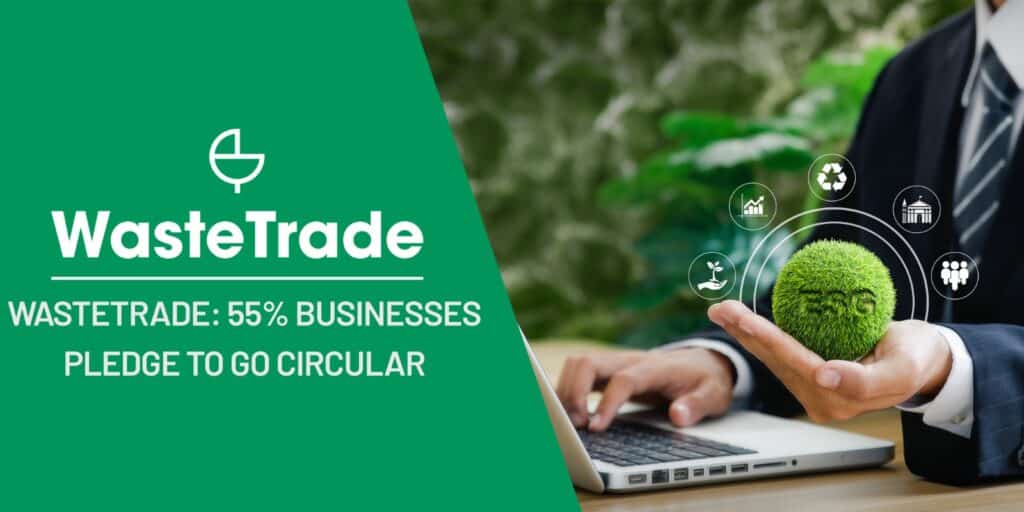Вер 20, 2023
55% Large Businesses Commit to Circularity, Yet Don’t Make the Change

A recent study released by Bain & Company found that over half of large enterprises, precisely 55%, have expressed commitments towards circularity. However, the prevailing “linear mindset” continues to hinder these companies from wholly incorporating it into their operational practices.
Circular Economy Business Practices
Of the organisations that were part of this survey, only 20% had confined their commitments to emissions, while 25% did not possess any commitments whatsoever. Going further, the investigation by Bain reveals that a staggering majority of the circular-oriented endeavours businesses are venturing into remain narrowly centred on recycling or waste management initiatives. This stands in contrast to the broader acceptance and integration of the essential technologies and business models, foundational to a genuine circular economy.
Several such examples mentioned in the research touch upon product longevity through reengineering, championing repairability, the induction of leasing models, curtailment of virgin material use, and rendering complementary services across a product’s lifecycle.
Bain’s discoveries are extensively detailed in their newly released brief titled ‘Strategy in a Circular World’, the foundation of which lies in a comprehensive survey involving 400 different organisations.
Jenny Davis-Peccoud, a leading partner at Bain & Company and the global head for the firm’s Sustainability & Responsibility practice, observed, “Executives will need to shift their mindsets to replace linear business models by decoupling growth from resource consumption.” She further added, “Companies have made a start by enhancing recycling and waste management. The next step for rapid advancement is the wholehearted adoption of novel technologies and reshaping their value chains.”
Key Areas of Circular Value
The study lays emphasis on three principal sources of “circular value” that companies should earnestly consider:
- Virgin material consumption rate: A direct measure of how much new raw material a company utilises.
- Product lifespan: The duration a product remains operational and useful.
- Product capacity utilisation: The efficiency and intensity of a product’s use during its lifecycle.
Companies that produce items with a limited life, for instance, plastic bottles, can unlock circular value and avenues for growth by curtailing virgin material usage and ensuring a complete recycling process at the product’s end-of-life.
Moreover, for companies manufacturing premium, high-value products that are durable and effortlessly disassembled, Bain suggests that elongating a product’s lifespan emerges as an adept strategy. Such enterprises are advised to reshape their business models to engage customers post-purchase and introduce cost-effective repair alternatives, including unwavering right-to-repair assurances.
Additionally, firms that churn out products demanding swift upgrades or those having a brief life cycle can elevate product utilisation through the exploration of varied uses, innovative sales strategies, and divergent business models.
Hernan Saenz, another influential partner at Bain & Company and the global leader of the company’s Performance Improvement practice, commented on the report’s implications, stating, “The ability to link circular strategies to business objectives and understand the industry’s future profit pools will be key to unlocking value.” He further elaborated, “For executives, visualising a circular future specific to their industry and translating that vision into tangible actions in the present is imperative.”
WasteTrade Perspective
For the numerous businesses aspiring to embed circularity into their core, the journey often appears daunting. The intricate logistics, comprehensive compliance, and the task of building robust connections within the recycling ecosystem can be substantial barriers. Enter WasteTrade: the cutting-edge tech solution that stands poised to revolutionise the recyclable commodities trading landscape.
At the heart of WasteTrade’s operations is an understanding of the complexities businesses face when trying to transition to circular models. By offering an online marketplace, WasteTrade efficiently connects waste producers with recyclers, and in turn, recyclers with manufacturers. This innovative approach ensures a seamless closure of the material use loop.
What truly sets WasteTrade apart, however, is its commitment to simplifying the recycling process for businesses. Instead of organisations grappling with the intricacies of logistics and compliance – areas that aren’t traditionally their expertise – WasteTrade shoulders this responsibility. By managing these critical, yet often cumbersome elements internally, it provides businesses the freedom to focus on their primary objectives while still championing circularity.
Trust and security remain paramount in such an ecosystem. With this in mind, WasteTrade institutes rigorous background checks on all its users. By validating licenses and ensuring other compliance documents are in order, the platform guarantees that no dubious actors can infiltrate the marketplace. This, in turn, fosters an environment of confidence and reliability, essential for businesses to make that pivotal shift towards circular practices.
For businesses sincerely hoping to fulfil their circularity pledges, WasteTrade isn’t just a facilitator – it’s a game-changer. By laying down the essential infrastructure and ensuring the smooth trading of recyclable commodities, WasteTrade stands as the beacon guiding enterprises toward genuine, sustainable circular business models.





